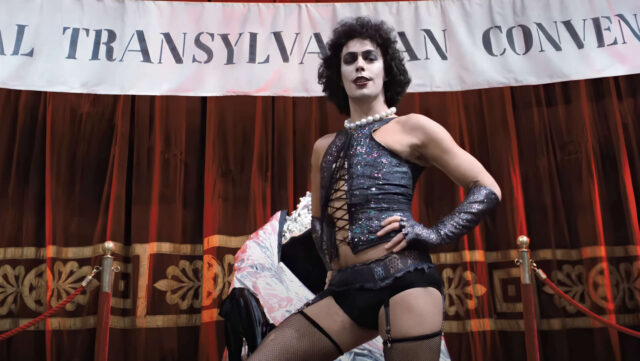Tim Curry is looking back at the wild ride of The Rocky Horror Picture Show five decades after its release, and reflecting on the film’s radical impact on audiences.
Now 78 and living with paralysis caused by a stroke, Curry rarely gives interviews. But in a new sit-down with CBS Sunday Morning, the actor opened up about stepping into his career-defining role as Dr. Frank-N-Furter, and why the film’s message still resonates.
“He’s a tough guy. And he expects the world to revolve around him,” Curry said of his fishnet-clad character, who he first played on stage in 1973 before reprising in the 1975 movie.
For the uninitiated, The Rocky Horror Picture Show is a campy, genre-bending musical about a straight-laced couple whose car breaks down, leading them to the bizarre castle of Dr. Frank-N-Furter — a self-proclaimed “sweet transvestite from Transsexual, Transylvania.” What follows is a riot of mad science, glitter, gender-bending, and unapologetic sexuality. With its rock soundtrack and embrace of the outrageous, the film gleefully broke every rule of traditional cinema in 1975.

From Failure to Cult Phenomenon
Though it’s impossible to imagine pop culture without Rocky Horror, Curry recalled the movie’s rocky start.
“It died a death. It was a failure. And I was crushed…I thought that it might well be [the end of my movie career],” he admitted.
But as midnight screenings grew into interactive events, with fans dressing up, singing along, and reveling in the chaos, the film transformed into the ultimate cult classic. “For your first movie to run for 50 years is crazy,” Curry said.
A Queer Classic That Changed Lives
For LGBTQ+ audiences, Rocky Horror wasn’t just campy fun. It was permission. With Frank-N-Furter at its center, the movie pushed boundaries around gender, sexuality, and desire in ways few mainstream films had dared.
“I’ve had people who left [the film] thinking they would say the stuff they had always wanted to say, and did,” Curry shared. When asked if the movie gave people the freedom to be themselves, he answered simply: “I think so.”
A Lasting Legacy
Today, Curry credits the film’s endurance to that message of liberation. As he put it:
“Be who you want to be — and have the b—-s to do it.”
Fifty years later, The Rocky Horror Picture Show remains a queer touchstone, proof that a so-called failure can become a cultural revolution in fishnets and heels.



